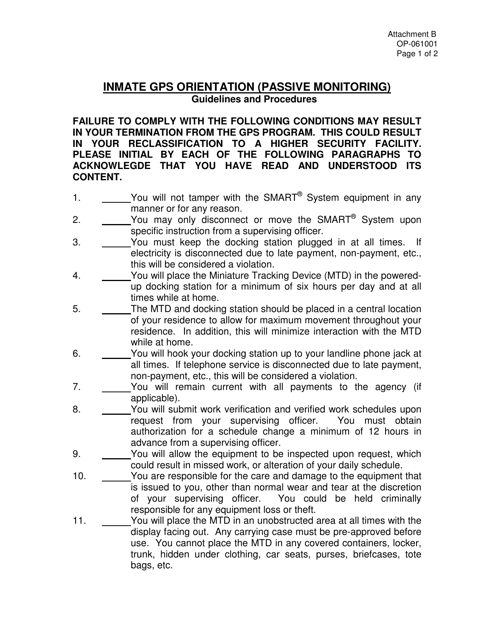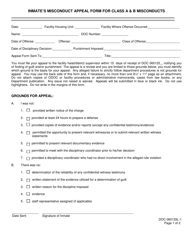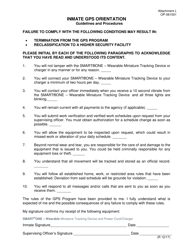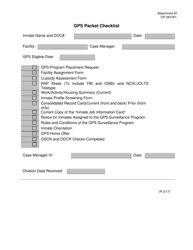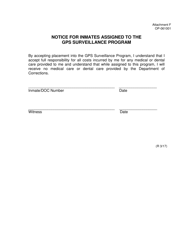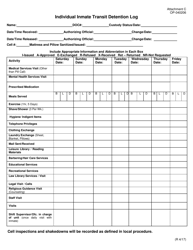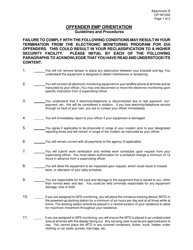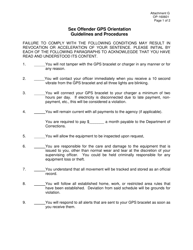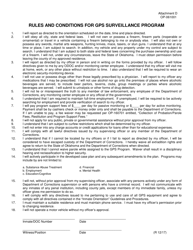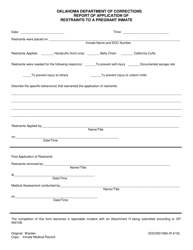DOC Form OP-061001 Attachment B Inmate Gps Orientation (Passive Monitoring) Guidelines and Procedures - Oklahoma
What Is DOC Form OP-061001 Attachment B?
This is a legal form that was released by the Oklahoma Department of Corrections - a government authority operating within Oklahoma. As of today, no separate filing guidelines for the form are provided by the issuing department.
FAQ
Q: What is the purpose of the Inmate GPS Orientation (Passive Monitoring) Guidelines and Procedures?
A: The purpose of the Inmate GPS Orientation (Passive Monitoring) Guidelines and Procedures is to provide guidelines and procedures for the use of GPS monitoring for inmates in Oklahoma.
Q: What is GPS monitoring for inmates?
A: GPS monitoring for inmates is a system that uses GPS technology to track and monitor the movements of inmates.
Q: Who is responsible for the implementation of GPS monitoring for inmates?
A: The Oklahoma Department of Corrections (ODOC) is responsible for the implementation of GPS monitoring for inmates.
Q: What are the guidelines and procedures for GPS monitoring?
A: The guidelines and procedures include instructions on how to properly orient inmates to the GPS monitoring system, how to handle GPS monitoring equipment, and how to document and report any issues or incidents related to the GPS monitoring.
Q: What are the benefits of GPS monitoring for inmates?
A: GPS monitoring for inmates can enhance public safety by providing real-time location data and monitoring of the movements of inmates, ensuring compliance with court-ordered restrictions, and aiding in the supervision and management of offenders.
Q: What are some of the key requirements for inmates placed on GPS monitoring?
A: Some of the key requirements for inmates placed on GPS monitoring include following a specific schedule, staying within designated areas, and complying with any other court-ordered restrictions.
Q: How is the privacy of inmates protected during GPS monitoring?
A: The guidelines and procedures include provisions for protecting the privacy of inmates during GPS monitoring, such as limiting access to the GPS data and ensuring that the data is used only for the purpose of monitoring and supervising inmates.
Q: What happens if an inmate violates the GPS monitoring rules?
A: If an inmate violates the GPS monitoring rules, appropriate action will be taken, which may include disciplinary measures, revocation of privileges, or criminal charges.
Q: How is the accuracy of the GPS monitoring system ensured?
A: The guidelines and procedures include requirements for testing and calibrating the GPS monitoring equipment to ensure its accuracy.
Q: Are there any exceptions to the use of GPS monitoring for inmates?
A: There may be exceptions to the use of GPS monitoring for inmates in certain cases, such as when it is determined to be medically or technologically infeasible.
Q: Are there any fees associated with GPS monitoring for inmates?
A: There may be fees associated with GPS monitoring for inmates, which may be the responsibility of the inmate or their family, depending on the specific circumstances.
Form Details:
- Released on March 1, 2017;
- The latest edition provided by the Oklahoma Department of Corrections;
- Easy to use and ready to print;
- Quick to customize;
- Compatible with most PDF-viewing applications;
- Fill out the form in our online filing application.
Download a printable version of DOC Form OP-061001 Attachment B by clicking the link below or browse more documents and templates provided by the Oklahoma Department of Corrections.
